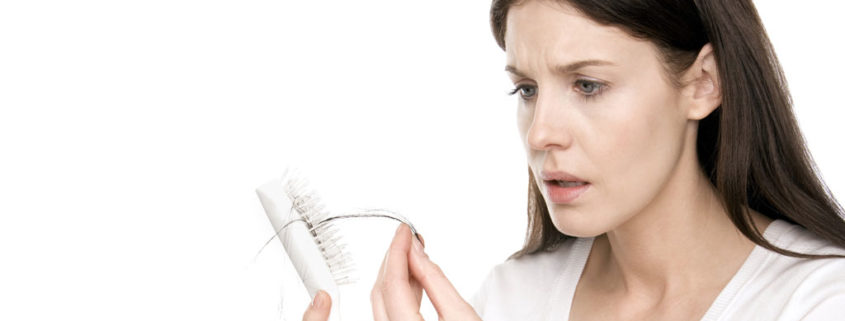Postpartum Hair Loss
Postpartum hair loss is a normal and temporary, however, not all women experience postpartum hair loss, but it is quite common. Fortunately, this is a totally temporary situation. Typically, it’ll take three to four months for the hair growth phase to cycle through.
During pregnancy, your hormones change dramatically. Hormones are the biggest reason for your pregnancy hair changes and postpartum hair loss.
So after your baby arrives and your hormone levels drop, your hair makes up for the lost time by falling out in much bigger clumps than it normally does. The total volume of your hair loss probably isn’t more than you would have lost over the last nine months, it just seems like it because it’s happening all at once.
Postpartum hair loss can set in any day after your baby arrives, and it sometimes continues as long as a year. It usually peaks around the 4-month mark, so if your baby is a few months old and you’re still losing clumps of hair, that doesn’t mean it’s time to panic!
Causes
While breastfeeding is often blamed for hair loss, there is no evidence to show that breastfeeding causes or increases hair loss in the postpartum period. Unfortunately, this is a symptom that almost all moms will experience. While this condition can become extreme (called Postpartum Alopecia) some hair loss is normal and a natural part of postpartum. Most moms will experience this symptom somewhere around three months postpartum. It can last a few weeks or a few months, depending on how long your hair cycles last. Often moms forget that they are still considered postpartum by this point and don’t think to relate childbirth to this symptom. Blame it on hormones. During pregnancy, estrogen increases, which typically encourages hair growth and improves texture. But in the postpartum period, estrogen levels drop. Plus, you may have vitamin deficiencies lingering from pregnancy. All these factors along with the exhaustion that accompanies being a new parent can lead to hair loss. The other reason is that when you are pregnant your hair goes into a dormant cycle and you lose less hair. This is called the telogen phase. Eventually, your hair will go into the next phase (telogen effluvium) and fall out. Therefore, when you have the baby you start losing all of the hair that you didn’t lose when you were pregnant. The hair loss and regrowth will probably be most apparent in the area above your forehead. If you gained a lot of extra hair when you were pregnant, this can look quite dramatic.How to Handle Postpartum Shedding
It’s normal for your hair to thin out after pregnancy. If it’s not worrying you, you don’t need to do anything to treat it. And, unfortunately, there is nothing that has been shown to prevent or slow postpartum hair loss. But if your hair loss is bothering you, there are treatments you can try to make your hair appear fuller and healthier.- Skip the styling
- Consider a haircut
- Eat right
- Switch up your product routine
- Take your vitamins




Leave a Reply
Want to join the discussion?Feel free to contribute!